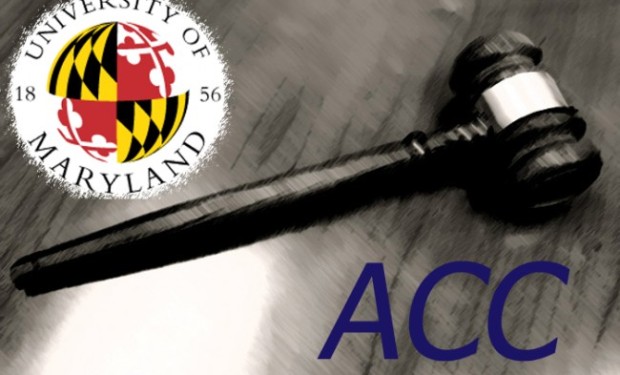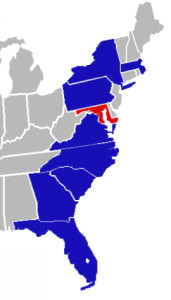N.C. Court of Appeals to hear argument over Terps’ exit fee dispute with the ACC [Updated]
The University of Maryland’s appeal of a Guilford County trial court’s denial of its motion to dismiss is slated to go before the North Carolina Court of Appeals on September 26, 2013.
Updated November 19, 2013: The N.C. Court of Appeals issued its opinion today, affirming the trial court’s denial (pdf) of sovereign immunity for the University of Maryland in the present litigation in North Carolina. The Court held that “because the public policy of this state does not allow the State of North Carolina to avoid its obligations in contract, we cannot extend comity to Defendants’ claim of sovereign immunity.
There are a number of problems plaguing college athletics today, and they all can seemingly be traced to one source: money. Television networks, the NCAA, and even the academic institutions all have their hands in the large pot of money created by lucrative television rights deals based on the efforts of student athletes across the country. Each school is eager to maximize its profits, and athletic conferences and television networks have been happy to oblige them. This has led to massive upheaval within athletic conferences across the country, leading some to disappear entirely, while others scramble to find new member institutions to sustain themselves.
Within this larger upheaval, the Atlantic Coast Conference (ACC) had not yet lost any members. In fact, the ACC gained several new institutions to expand the geographical reach of the conference and maximize its power in negotiations with television networks. That changed, however, when the University of Maryland announced in November of 2012 that it was leaving the ACC for the supposedly greener pastures of the Big Ten Conference.
The ACC increases its withdrawal fee and subsequently tries to enforce it against the University of Maryland.
In 2011, the ACC added two schools, Syracuse University and the University of Pittsburgh, to the conference, and in an effort to keep schools from leaving, the conference increased the withdrawal fee to $20 million. Less than two years later, the ACC once again amended its constitution by raising its withdrawal fee $32 million to a whopping $52 million. Maryland and Florida State voted against the increase in the withdrawal fee but were defeated. The vote occurred in September of 2012, and the increased fee was announced along with the admission of Notre Dame into the ACC. Although Maryland voted against the increased withdrawal fee, University of Maryland President Wallace Loh was quoted at the time as being pleased with the addition of Notre Dame, for the benefits the addition brought to the conference and to each member institution. Little did anyone know that a few short months after Notre Dame’s admission, Maryland—a charter member of the ACC—would exit to join the Big Ten.
Upon hearing of Maryland’s decision to leave, the ACC, pursuant to its constitution (beginning on page 118 of the record on appeal), attempted to enforce the $52 million withdrawal fee against the University. Maryland, however, would not agree to pay the withdrawal fee, forcing the ACC to file a lawsuit for declaratory relief against the University in an attempt to recoup the fee to which the conference thought it had a right. The ACC filed suit in North Carolina because the ACC’s home office—its principal place of business—is located in Greensboro.
In its complaint (beginning on page 2 of the record on appeal), the ACC alleged that even though Maryland had participated in the withdrawal fee vote, the University insisted it would not be paying the fee. The ACC further alleged that President Loh believed the fee was illegal and asked the court for a declaratory judgment to determine the rights of both the ACC and Maryland in regards to the withdrawal fee. Shortly thereafter, the University of Maryland sued the ACC in Maryland, alleging a breach of Maryland antitrust laws, breach of contract, and tortious interference with prospective advantage, in addition to seeking a declaratory judgment. The Maryland trial court dismissed the antitrust claim but kept the remaining claims while staying the proceedings until the North Carolina court ruled on the case.
The ACC filed its complaint in Guilford County, and in February of 2013, Judge John Craig III heard the University of Maryland’s motion to dismiss for lack of personal jurisdiction because of its alleged sovereign immunity under the laws of the state of Maryland. The trial judge denied the motion, leading the University to appeal and placing the two parties in their current situation, awaiting the September 26 oral argument at the North Carolina Court of Appeals.
Both sides’ briefs provide a preview of the questions the Court will ask on appeal.
In its appellants’ brief, the University of Maryland argues that under Maryland law it is entitled to sovereign immunity. The University further argues that because the Maryland legislature never waived the University’s sovereign immunity, no action could be maintained against it. The appellants then argue that under the doctrine of comity, North Carolina should recognize the sovereign immunity of the University.
The Supreme Court of the United States has not forced the states to recognize the sovereign immunity of other states, but the court has stated that states were free to do so. The Supreme Court of North Carolina has held that the sovereign immunity of other states should be upheld, as long as doing so would not violate the public policy of North Carolina. 1 Consequently, the University contends that recognizing its sovereign immunity would not violate the public policy of North Carolina and therefore, the trial court erred by not recognizing the University’s sovereign immunity under Maryland law. Furthermore, the appellants argue that declining to exercise comity was an error because the Supreme Court of North Carolina has held that courts of the state should extend comity, as long as doing so would not violate public policy.
 In contrast to the appellants’ brief, the ACC argues in its appellee’s brief that appellants should not have been allowed an interlocutory appeal and further argue that recognizing the University’s sovereign immunity would violate the public policy of the state. The ACC cites the North Carolina Court of Appeals as previously holding that recognizing comity was squarely in the discretion of the courts. Subsequently, if it were in the discretion of the courts, the correct standard on appeal would be that of abuse of discretion—a much more deferential standard towards the trial court. The ACC believes that if the appellate court were to look at the trial court’s order for an abuse of discretion, it would be unable to find one.
In contrast to the appellants’ brief, the ACC argues in its appellee’s brief that appellants should not have been allowed an interlocutory appeal and further argue that recognizing the University’s sovereign immunity would violate the public policy of the state. The ACC cites the North Carolina Court of Appeals as previously holding that recognizing comity was squarely in the discretion of the courts. Subsequently, if it were in the discretion of the courts, the correct standard on appeal would be that of abuse of discretion—a much more deferential standard towards the trial court. The ACC believes that if the appellate court were to look at the trial court’s order for an abuse of discretion, it would be unable to find one.
The ACC raises two further contentions. First, the Conference believes that even though it seeks a declaratory judgment, the action is essentially one for a breach of contract. The Maryland legislature has abolished sovereign immunity in contract cases; therefore, the University should not be recognized as having sovereign immunity. Second, and potentially more persuasively, the Conference argues that the University, by suing the Conference in Maryland, voluntarily gave up its rights to sovereign immunity to the overlapping issues between the action commenced in Maryland and the present litigation in North Carolina.
For the Conference, settling the case and allowing Maryland to leave on the Conference’s terms will provide a public image boost for the ACC.
There is a lot at stake for both sides. If the Court were to affirm the trial court’s denial of comity, the University would most likely appeal to the Supreme Court of North Carolina. If the Supreme Court were to decline to hear the University’s appeal or affirm the lower courts’ rulings, however, the pressure would be on the University to settle with the ACC. Settlements have been commonplace in other instances of universities wishing to switch conferences. Neither side will get exactly what they want, but for the Conference, settling the case and allowing Maryland to leave on the Conference’s terms will provide a public image boost for the ACC. Maryland would also save money by settling and be able to proceed with joining the Big Ten Conference free from the legal proceedings. A victory for the ACC in court, or a settlement on their terms, could slow the movement of universities from one conference to another as they see the economic price it would take.
If the court were to reverse the trial court’s denial of comity, and an appeal by the ACC led to a denial of review or siding with the University by the Supreme Court of North Carolina, the legal proceedings would come to a screeching halt. There would still be the action in Maryland, however, which currently remains stayed pending the outcome of the case in North Carolina. Maryland could look to dismiss its own case and avoid any further legal battles, thus ending the legal melee.
If the legal actions were to stop, would the ACC be entitled to the earlier withdrawal fee of $20 million? Could Maryland leave the conference without paying? These are questions that can only be answered following a ruling by the Court of Appeals, presumably by the end of the year.







